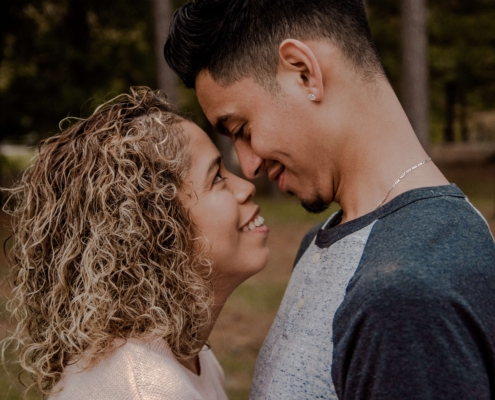Communicating with Your Partner for Better Connection
Connection, we all crave it. Studies show that when we are connected with people we love, we live longer lives. We seek connection through family and friends. It is our intimate relationships that provide the greatest forms of connection. Communicating with your partner in a healthy way promotes connection and intimacy. When communication struggles emerge we often find ourselves feeling isolated and misunderstood. These negative emotions lead to arguments – or worse, we stop communicating altogether.
If you find yourself struggling to connect and communicate with your partner, there are things you can do to help. Communication skills can be learned at any age and stage of the relationship.
Two types of communication
Communication is essential to a happy, healthy partnership. There are two parts to healthy communication: speaking and listening. When we think of communicating our needs, we usually focus on the words we speak. And when speaking, it’s helpful to remember that communication goes beyond the words we speak. There are two types of communication that come together to create the message we speak:
Verbal: Verbal communication is the most obvious form of communication. These are the words we speak. While it is crucial that we are aware of the content of our words, they only play a part in the message that is received by our partner. Non-verbal cues provide a great deal of context to our words and can greatly affect how our message is received.
Non-verbal: Non-verbal communication encompasses our tone (sarcasm, sympathy, frustration…), body language (engaged, aloof, connected…), and even our presentation (composed, erratic, disorganized…). Studies have shown that non-verbal communication is equally (if not more) important to verbal communication when discussing difficult topics.
As mentioned earlier, speaking is only one part of communication. It is important that we speak clearly and that our verbal and non-verbal communications match our intentions. In a relationship, it is also critical that we are good listeners. To improve communication in a relationship, we must discover how to listen, not how to talk.
“The biggest communication problem is we do not listen to understand. We listen to reply.”
Stephen R. Covey
Signs you may struggle to communicate with your partner
When we have poor communication we often feel unheard or misunderstood. Here are some indicators that your communication isn’t working:
- Feeling misunderstood
- Feeling unheard
- Frequent fights and arguments
- Emotionally distant
- Increased resentment
- Cyclical arguments that are never resolved
- Passive Aggression
- Getting defensive
- Criticizing or belittling
- Lack of emotional intimacy
- Stubbornness and the need to “win”
Tips for communicating with your partner
 The biggest misconception about how to communicate in a relationship is that communication is the same as talking or making conversation. Communication in partnerships, at its core, is about connecting with your spouse to offer support and to understand their point of view. Below are some helpful tips for communicating with your partner.
The biggest misconception about how to communicate in a relationship is that communication is the same as talking or making conversation. Communication in partnerships, at its core, is about connecting with your spouse to offer support and to understand their point of view. Below are some helpful tips for communicating with your partner.
Stay focused on the current topic
It may be tempting to bring up past events, but doing so will often lead to unproductive arguments. This often clouds the issue and makes finding mutual understanding and a solution to the current issue less likely. Try not to bring up past hurts or other topics. Stay focused on the present, your feelings, understanding one another, and finding a solution.
If there is a long history of similar conflicts, then it may be helpful to sort through these past events with a counselor. The counselor will help you understand the commonalities among all the past events and will help you discuss and resolve the issues with clarity and focus.
Listen Carefully
People often think they are listening, but really they are thinking of what they want to say next. Remember, healthy communication includes listening to understand. When your partner is speaking, don’t interrupt and don’t get defensive. When they are done speaking, first try to repeat back to them what you think you heard. This will let them know you are hearing them and will also give them an opportunity to clear up any misconceptions.
Respond to criticism with empathy
 It can be tough to hear criticism and not become defensive. It is helpful to remember that your partner is trying to communicate how your behavior is making them feel. Even if your partner isn’t using those words, try and pull out how they are feeling. When you can connect and talk about their experience, it will be easier to connect and find a mutual solution.
It can be tough to hear criticism and not become defensive. It is helpful to remember that your partner is trying to communicate how your behavior is making them feel. Even if your partner isn’t using those words, try and pull out how they are feeling. When you can connect and talk about their experience, it will be easier to connect and find a mutual solution.
Own what is yours
Personal responsibility is a strength, not a weakness. Healthy communication involves admitting when you’re wrong. Even if you didn’t mean to hurt or offend your partner, it is healthy and productive to admit when you have caused your partner pain.
Use “I” statements for communicating with your partner
Instead of saying things like “You hurt me” or “You really messed up here”, begin statements with “I” and make them about yourself and your feelings, like, “I feel hurt and unimportant when this happens…”. “I” statements are less accusatory, less likely to spark defensiveness, and help the other person understand your point of view. I statements help you communicate clearly with your partner.
Take a time out when communicating with your partner
Sometimes tempers get heated and it’s just too difficult to continue a discussion without it becoming an argument or a fight. If you feel yourself or your partner starting to get too angry to be constructive, it’s okay to take a break from the conversation until you have had some time to cool off. It is important that you intentionally seek out activities to cool off and return to the conversation.
Sometimes communicating with your partner well means knowing when to take a break.
Remember that the goal of effective communication skills should be mutual understanding and finding a solution that pleases both parties, not “winning” the argument or “being right.” This doesn’t work in every situation, but sometimes (if you’re having a conflict in a romantic relationship) it helps to hold hands or stay physically connected as you talk. This can remind you that you still care about each other and generally support one another.
Keep in mind that it’s important to remain respectful of the other person, even if you don’t like their actions.
When your partner isn’t on board
 If your partner is not interested in learning how to improve their communication skills, that is okay. It does not mean that your relationship is doomed. Rather, you are just the first person to make the decision to improve aspects of the relationship. Since the goal of effective communication is mutual understanding, you can help make communication feel easier by practicing clear verbal and non-verbal skills and demonstrating good listening skills. By doing this, you will diffuse the situation and create a more harmonious atmosphere for communication to occur. Of course, boundaries and reciprocal attention are important in a partnership. It may be helpful to enlist the help of a counselor to ensure that you are not creating or maintaining unhealthy relationship patterns.
If your partner is not interested in learning how to improve their communication skills, that is okay. It does not mean that your relationship is doomed. Rather, you are just the first person to make the decision to improve aspects of the relationship. Since the goal of effective communication is mutual understanding, you can help make communication feel easier by practicing clear verbal and non-verbal skills and demonstrating good listening skills. By doing this, you will diffuse the situation and create a more harmonious atmosphere for communication to occur. Of course, boundaries and reciprocal attention are important in a partnership. It may be helpful to enlist the help of a counselor to ensure that you are not creating or maintaining unhealthy relationship patterns.
Texas-based Couples Counseling may help you with communicating with your partner
If one or both of you has trouble staying respectful during the conflict, or if you’ve tried to resolve conflict with your partner on your own and the situation isn’t improving, you might benefit from a few sessions with a couples therapist. Couples counseling or family therapy can provide help with contentious arguments and can teach skills to resolve future conflicts. If your partner is not interested in going to counseling, you can still benefit from going alone.
The Well House Group has counselors who specialize in couples counseling in Southlake, Texas. If you are curious about other resources or are interested in learning how to communicate with your partner, contact us. We work with couples all over the Dallas-Fort Worth area. For those located outside of the DFW metroplex, we offer secure Telehealth counseling through our HIPAA compliant servers. We look forward to helping you improve your relationships with your loved ones.
